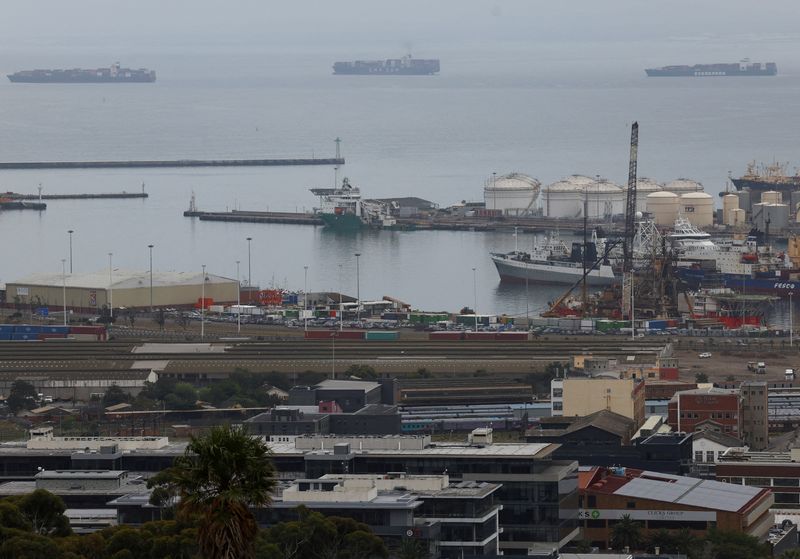By Wendell Roelf
CAPE TOWN (Reuters) - Shipping companies sailing around the Cape of Good Hope to avoid Houthi attacks on the Red Sea face tough choices over where to refuel and restock, as African ports struggle with red tape, congestion and poor facilities, companies and analysts say.
Hundreds of large vessels are rerouting around the southern tip of Africa, a longer route adding 10-14 days of travel, to escape drone and missile attacks by Yemeni Houthis that have pushed up oil prices and freight rates.
The attacks by Iranian-backed militants have disrupted international trade through the Suez Canal, the shortest shipping route between Europe and Asia, which accounts for about a sixth of global traffic.
South Africa's major ports, including Durban, one of Africa's largest in terms of container volumes handled, as well as Cape Town and Ngqura ports are among the worst performing globally, a World Bank 2022 index released in May found.
"Even the state that Durban is in now, it is still the most advanced and largest port in Africa, so ships rerouting around the continent have very limited choices for berthing for replenishment," Alessio Lencioni, a logistics and supply chain consultant told Reuters.
Other large African deep-water ports along the Cape route, such as Mombasa in Kenya and Dar es Salaam in Tanzania are too ill-equipped to handle the expected traffic over the next couple of weeks, Lencioni said.
Maersk said vessels routed around the Cape will as far as possible try to fuel at origin or destination.
"In case there is a need for bunkering en route, it would be decided on a case by case basis with Walvis Bay (Namibia) or Port Louis (Mauritius) being the top options," a spokesperson said.
CAPE OF STORMS
Rough weather with high seas, common at the 'Cape of Storms' as well as the cyclone-prone Mozambique Channel, mean ships could burn through their fuel quicker, making refuelling services crucial, shippers said.
"In Singapore, we’re delivering larger bunker volumes to vessels that will now be sailing longer voyages," a spokesperson for TFG Marine, a unit of energy trader Trafigura, said.
Bureaucracy is a concern. In September, South Africa's national revenue service detained five bunkering vessels in Algoa Bay on suspicion of contravening the Customs and Excise Act. BP (NYSE:BP), Trafigura and Mercuria have all been hit by suspensions pending audits.
Since South Africa's first ship-to-ship offshore bunkering started in Algoa Bay in 2016, there has been a sharp rise in fuel volumes and vessels using it.
A spokesperson for Heron Marine, the TFG Marine affiliate operating in Algoa Bay, said the company is working with customers to manage their bunkering requirements. Mercuria and BP did not immediately respond to questions.

In anticipation of more marine fuel being needed, imports are expected to rise to around 230 kilotonnes in December, analysts say.
"South Africa is expecting a record high of fuel oil imports for December," because of demand for refuelling linked to the Houthi crisis, Younes Azzouzi, market analyst at data and analytics specialist Kpler said.
(additional reporting by Jonathan Saul in London; Editing by Tim Cocks and Barbara Lewis)